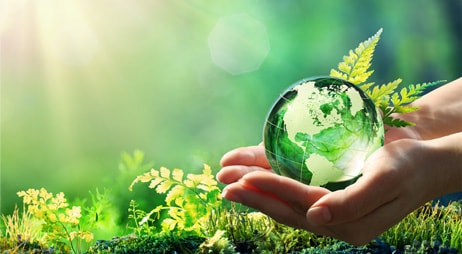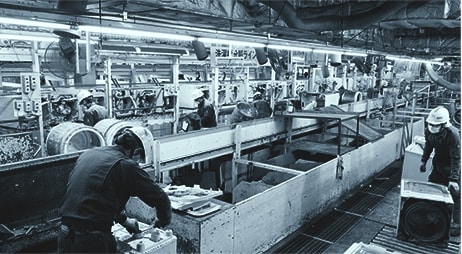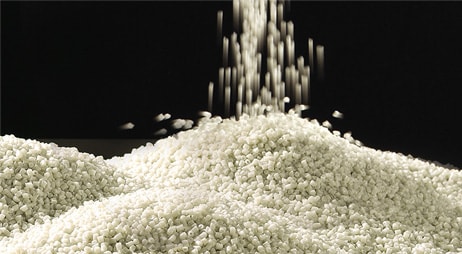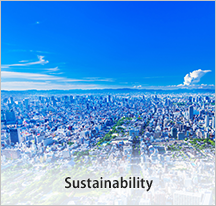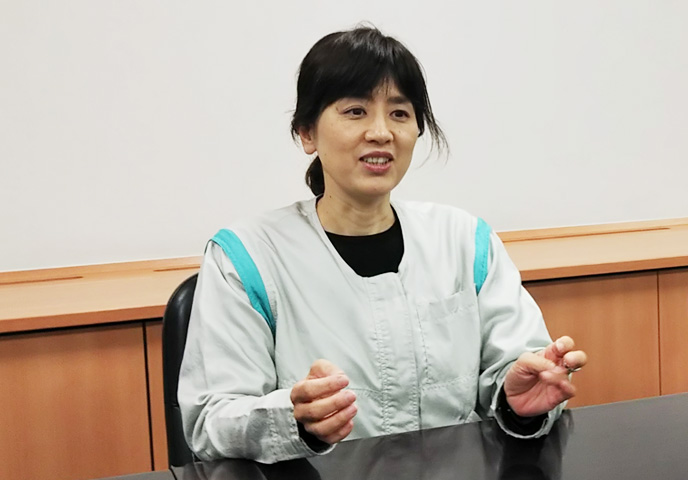
About Closed-loop Plastic Material Recycling Technology
Yoko Fukushima, Manager
R&D Division, Smart Appliances & Solutions Business Unit
(Department and job title as of November 22, 2019)
Reducing Final Landfill Disposal and Reusing Resources
There are basically two kinds of environmental problems in manufacturing. One is environmental constraint: how to limit final landfill disposal amidst the large amount of waste generated during manufacturing and other processes. The other problem is resource constraint: how to meet increasing demand for resources among newly emerging economies and amidst ongoing depletion of fossil resources. Both of these problems must be addressed to achieve a circular economy: reduce final landfill disposal while developing technologies for recovering and reusing resources from waste.
Home Appliance Recycling Act Spurs Technological Development
In 2001, Japan enacted the Act on Recycling of Specified Kinds of Home Appliances (Home Appliance Recycling Act), under which manufacturers are obligated to collect and recycle four home appliances: air conditioners, TVs, refrigerators, and washing machines. Mandatory recycling rates were stipulated for each appliance and at first the focus was on recycling of metal, the easiest material to recycle. At the time, while most manufacturers’ washing machines used steel outer cabinets, Sharp machines were made of plastic. In order to meet the law’s recycling rate target, Sharp embarked on developing plastic material recycling technology.
Open-loop recycling, used for things like sundries, is the most common type of material recycling. But in open-loop recycling, material is only recycled once before being thrown away as waste.
We believed that if we could recycle the plastic from the four appliances as molded products, materials could be collected and reused multiple times. This was the impetus for the joint development of closed-loop plastic material recycling technology with Kansai Recycling Systems.
The idea of our closed-loop material recycling is to have the plastic collected at Kansai Recycling Systems’ plant transformed into usable material at a materials processing company and then reused in new products from Sharp. From the launch of closed-loop material recycling in fiscal 2001 until the end of fiscal 2018, we produced a cumulative total of approximately 17,000 metric tons of recyclable materials.
Closed-loop Plastic Material Recycling Flow

Amount of Recycled Plastic Used (cumulative)
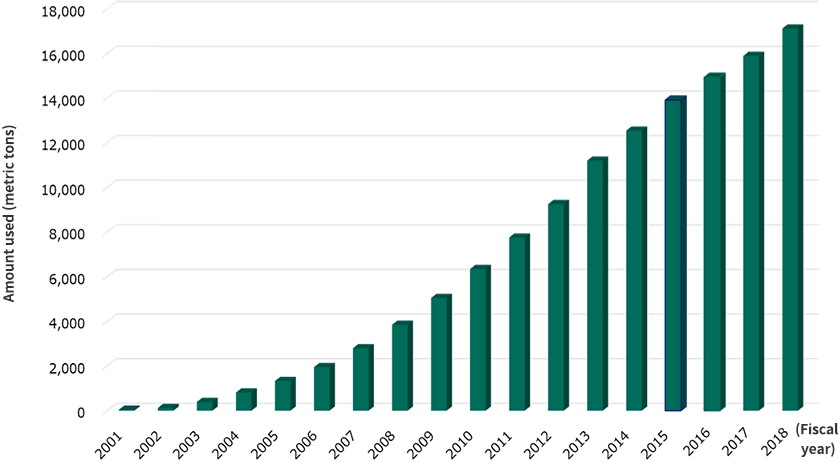
3rd Round of Closed-loop Plastic Material Recycling
Recycled materials used in consumer durables such as appliances must maintain stable properties for at least a dozen years. Because the used appliances collected for recycling are of various ages and from various manufacturers, quality control is crucial to achieving and maintaining such stable properties. That’s why Sharp collaborates with Kansai Recycling Systems and materials processing companies in developing disassembly and recovery technologies and quality control technologies. R&D towards achieving such technologies includes studying ways to recover high-purity plastic, and figuring out how to blend additives that bring back the material qualities that have deteriorated over the years.
It’s been almost 20 years since the start of closed-loop material recycling. At first, tubs used in washing machines were collected and recycled for the original purpose. Today we are in the third round of this cycle. Washing machines made from recycled materials have their condition checked, and their materials are again recycled for use in new products.
Recycling Washing Machine Tubs
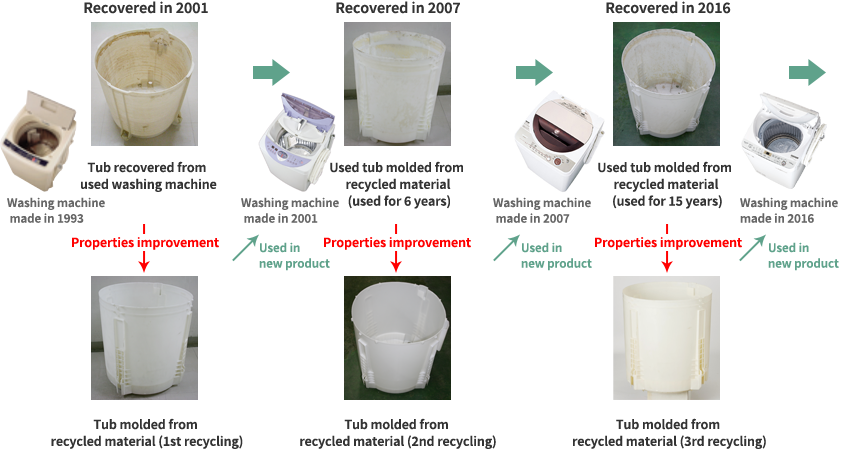
Dramatic Reductions in CO2 Emissions
Besides making effective use of resources, recycling also reduces CO2 emissions. If a product using virgin material is recycled once, it reduces CO2 emissions by 40%, but if the material is recycled five times, the total CO2 reductions are about 70% (according to Sharp). The more times material is recycled, the greater the CO2 reduction effect. That’s why Sharp is developing recycling technologies that will allow materials to be recycled over and over again.
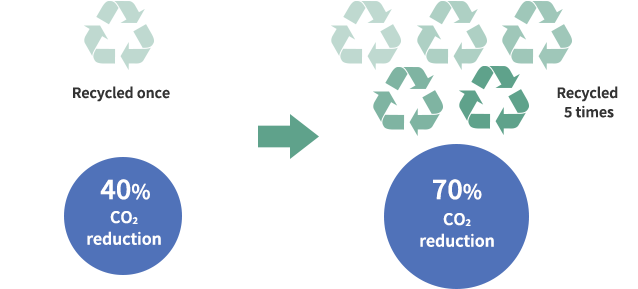
Third-party Honors for Closed-loop Material Recycling
Sharp’s closed-loop material recycling efforts have been lauded by third parties. Recently, the technology received the Judging Panel Chair Prize (award of excellence) in the 2nd EcoPro Awards for contributing to a sustainable society. See more (in Japanese only).
Judging Panel Chair Prize (award of excellence) in the 2nd EcoPro Awards
-
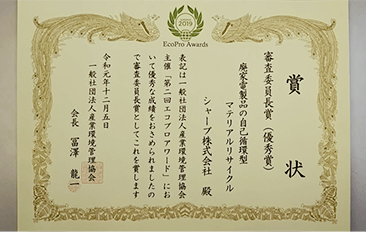
Award certificate
-
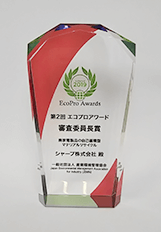
Trophy
Honors for Closed-loop Material Recycling
| Year | Name | Organized by |
|---|---|---|
| 2019 | Judging Panel Chair Prize, 2nd EcoPro Awards | Japan Environmental Management Association for Industry (JEMAI) |
| 2018 | 44th Iwatani Naoji Memorial Award (Japan) | Iwatani Naoji Foundation |
| 2011 | Clean Japan Center Chairman’s Prize; 2011 Resource Recycling Technologies and Systems Commendation | Clean Japan Center (now JEMAI) |
| 2010 | Technological Achievement Award | Research Association for Feedstock Recycling of Plastics, Japan |
| 2008 | Director-General’s Prize, Industrial Science and Technology Policy and Environment Bureau, Ministry of Economy, Trade and Industry; 2008 Resource Recycling Technologies and Systems Commendation | Clean Japan Center (now JEMAI) |
| 2004 | Best Technology Award | Japan Society of Polymer Processing |
| 2004 | Education, Culture, Sports, Science and Technology Minister’s Prize; 13th Global Environment Awards | Fujisankei Communications Group |


